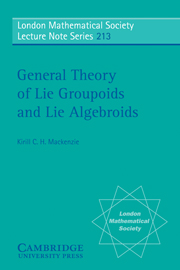Book contents
- Frontmatter
- Contents
- Prologue
- Introduction
- Preface
- TERMINOLOGY AND NOTATION
- ACKNOWLEDGEMENTS
- PART ONE THE GENERAL THEORY
- PART TWO THE TRANSITIVE THEORY
- 5 Infinitesimal Connection Theory
- 6 Path Connections and Lie Theory
- 7 Cohomology and Schouten Calculus
- 8 The Cohomological Obstruction
- PART THREE THE POISSON AND SYMPLECTIC THEORIES
- Appendix
- Bibliography
- Index
6 - Path Connections and Lie Theory
from PART TWO - THE TRANSITIVE THEORY
Published online by Cambridge University Press: 05 April 2013
- Frontmatter
- Contents
- Prologue
- Introduction
- Preface
- TERMINOLOGY AND NOTATION
- ACKNOWLEDGEMENTS
- PART ONE THE GENERAL THEORY
- PART TWO THE TRANSITIVE THEORY
- 5 Infinitesimal Connection Theory
- 6 Path Connections and Lie Theory
- 7 Cohomology and Schouten Calculus
- 8 The Cohomological Obstruction
- PART THREE THE POISSON AND SYMPLECTIC THEORIES
- Appendix
- Bibliography
- Index
Summary
The previous chapter was concerned with connections in abstract Lie algebroids, both as global maps and localized with respect to open covers of the base. The present chapter deals with the process by which an infinitesimal connection in the Lie algebroid of a locally trivial Lie groupoid may be integrated to a law of path lifting; that is, to a path connection.
Preparatory to this, in §6.1 we construct the monodramy groupoid of a locally trivial and α–connected Lie groupoid. This plays the role which for Lie groups is played by the universal covering of a connected Lie group. Indeed in terms of a principal bundle with connected total space P, the monodramy bundle has total space the universal cover of P (and the same base space).
In §6.2 we prove versions of the First and Second integrability theorems of Lie for locally trivial Lie groupoids and transitive Lie algebroids. The proofs are reasonably straightforward extensions of the methods known for Lie groups and Lie algebras; we will see, however, that they cover a range of phenomena not within the scope of Lie group theory.
§6.3 formalizes the concept of path connection in a locally trivial Lie groupoid Ω and establishes the correspondence between path connections in Ω and infinitesimal connections in the Lie algebroid AΩ. The path lifting associated with an infinitesimal connection is usually treated as a subsidiary concept — given an infinitesimal connection, there is an associated path connection.
- Type
- Chapter
- Information
- General Theory of Lie Groupoids and Lie Algebroids , pp. 212 - 256Publisher: Cambridge University PressPrint publication year: 2005



